Related Research Articles
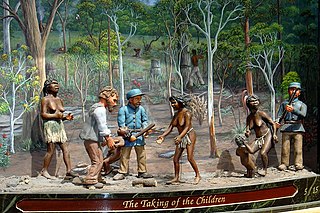
The Stolen Generations were the children of Australian Aboriginal and Torres Strait Islander descent who were removed from their families by the Australian federal and state government agencies and church missions, under acts of their respective parliaments. The removals of those referred to as "half-caste" children were conducted in the period between approximately 1905 and 1967, although in some places mixed-race children were still being taken into the 1970s.
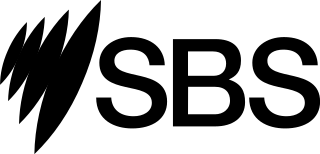
The Special Broadcasting Service (SBS) is an Australian hybrid-funded public service broadcaster. About 80 percent of funding for the company is derived from the Australian Government. SBS operates six TV channels and seven radio networks.
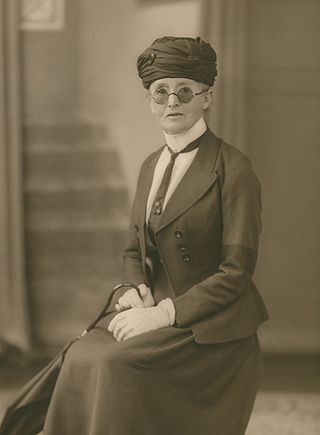
Daisy May Bates, CBE was an Irish-Australian journalist, welfare worker and self-taught anthropologist who conducted fieldwork amongst several Indigenous nations in western and southern Australia. Bates was a lifelong student of Australian Aboriginal culture and society and was the first anthropologist to carry out a detailed study of Australian Aboriginal culture.
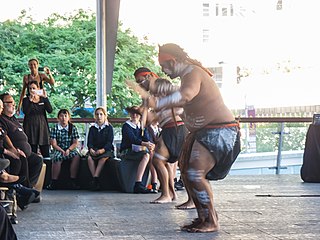
National Sorry Day, officially the National Day of Healing, is an event held annually in Australia on 26 May commemorating the Stolen Generations. It is part of the ongoing efforts towards reconciliation between Indigenous and non-Indigenous Australians.
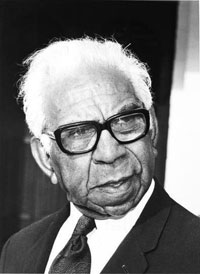
Sir Douglas Ralph Nicholls was a prominent Aboriginal Australian from the Yorta Yorta people. He was a professional athlete, Churches of Christ pastor and church planter, ceremonial officer and a pioneering campaigner for reconciliation.
Aboriginal Protection Board, also known as Aborigines Protection Board, Board for the Protection of Aborigines, Aborigines Welfare Board, and similar names, refers to a number of historical Australian state-run institutions with the function of regulating the lives of Aboriginal Australians. They were also responsible for administering the various half-caste acts where these existed and had a key role in the Stolen Generations. The boards had nearly ultimate control over Aboriginal people's lives.
NAIDOC Week is an Australian observance lasting from the first Sunday in July until the following Sunday. The acronym NAIDOC stands for National Aborigines' and Islanders' Day Observance Committee. NAIDOC Week has its roots in the 1938 Day of Mourning, becoming a week-long event in 1975.

The Freedom Ride of 1965 was a journey undertaken by a group of Aboriginal Australians in a bus across New South Wales, led by Charles Perkins. Its aim was to bring to the attention of the public the extent of racial discrimination in Australia, and it was a significant event in the history of civil rights for Indigenous Australians.
The history wars is a term used in Australia to describe the public debate about the interpretation of the history of the European colonisation of Australia and the development of contemporary Australian society, particularly with regard to their impact on Aboriginal Australian and Torres Strait Islander peoples. The term "history wars" emerged in the late 1990s during the term of the Howard government, and despite efforts by some of Howard's successors, the debate is ongoing, notably reignited in 2016 and 2020.
The Australian colonies and in the nineteenth century created offices involved in dealing with indigenous people in the jurisdictions.

Coranderrk was an Aboriginal reserve run by the Victorian government between 1863 and 1924, located around 50 kilometres (31 mi) north-east of Melbourne. The residents were mainly of the Woiwurrung, Bunurong and Taungurung peoples, and the first inhabitants chose the site of the reserve.
John Kundereri "Jumbana" Moriarty is an Aboriginal Australian artist, government advisor and former soccer player. He is also known as founder of the Balarinji Design Studio, for painting two Qantas jets with Aboriginal motifs.

William Cooper was an Aboriginal Australian political activist and community leader; the first to lead a national movement recognised by the Australian Government.
The voting rights of Indigenous Australians became an issue from the mid-19th century, when responsible government was being granted to Britain's Australian colonies, and suffrage qualifications were being debated. The resolution of universal rights progressed into the mid-20th century.

National Indigenous Television (NITV) is an Australian free-to-air television channel that broadcasts programming produced and presented largely by Aboriginal and Torres Strait Islander people. It includes the six-day-a-week NITV News Update, with programming including other news and current affairs programmes, sports coverage, entertainment for children and adults, films and documentaries covering a range of topics. Its primary audience is Indigenous Australians, but many non-Indigenous people tune in to learn more about the history of and issues affecting the country's First Nations peoples.
Karla Grant is an Australian presenter, producer and journalist for the SBS's national Indigenous current affairs program Living Black, focusing on issues concerning Aboriginal and Torres Strait Islander communities within Australia.
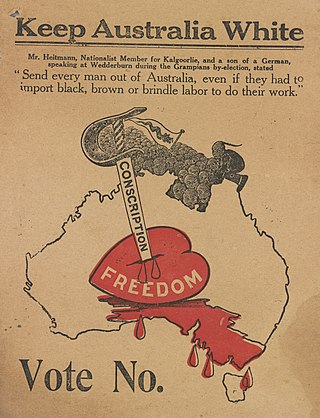
Racism in Australia comprises negative attitudes and views on race or ethnicity which are related to each other, are held by various people and groups in Australia, and have been reflected in discriminatory laws, practices and actions at various times in the history of Australia against racial or ethnic groups.

The Australian Aborigines' League was established in Melbourne, Australia, in 1933 by William Cooper and others, including Margaret Tucker, Eric Onus, Anna and Caleb Morgan, and Shadrach James. Cooper was secretary of the League.
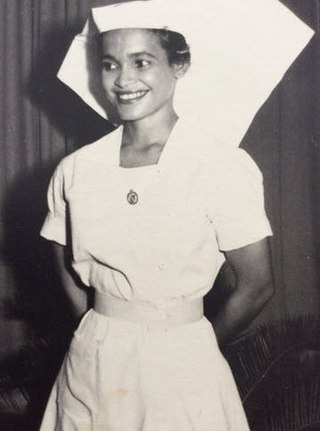
MaryAnn Bin-Sallik is a Djaru Elder and Australian academic, specialising in Indigenous studies and culture. She was the first Indigenous Australian to gain a doctorate from Harvard University.
References
- ↑ "Prime time Aborigines", Tribune, 22 March 1989
- ↑ Anderson, Doug (3 April 1989), "One more racist brick falls", The Sydney Morning Herald
- ↑ Morris, Joan (4 April 1989), "All-Aboriginal TV show tonight", The Canberra Times
- ↑ Weiniger, Peter (30 March 1989), "SBS tries a first for Aborigines", The Age
- ↑ Hooks, Barbara (4 April 1989), "Aborigines get their own prime-time show", The Age